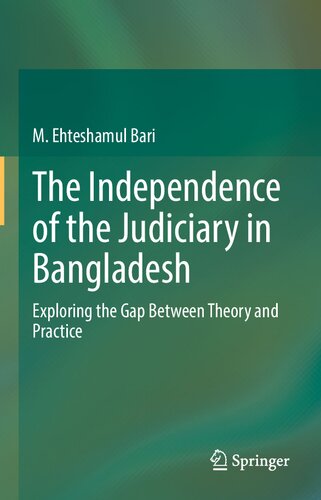

Most ebook files are in PDF format, so you can easily read them using various software such as Foxit Reader or directly on the Google Chrome browser.
Some ebook files are released by publishers in other formats such as .awz, .mobi, .epub, .fb2, etc. You may need to install specific software to read these formats on mobile/PC, such as Calibre.
Please read the tutorial at this link: https://ebookbell.com/faq
We offer FREE conversion to the popular formats you request; however, this may take some time. Therefore, right after payment, please email us, and we will try to provide the service as quickly as possible.
For some exceptional file formats or broken links (if any), please refrain from opening any disputes. Instead, email us first, and we will try to assist within a maximum of 6 hours.
EbookBell Team

4.3
58 reviewsThis book highlights that an independent judiciary is indispensable for the very existence of any society based on democratic values, such as the observance of the rule of law and respect for the human rights of individuals. In order to ensure that the judiciary’s interpretation of the law is not bound by the will of the executive and that it is able to call the executive to account by protecting the life as well as liberty of the governed, it is imperative to guarantee, among other things, a transparent method of appointment and the security of tenure of the judges. Taking into account the importance of an independent judiciary in a democratic society, the framers of the Constitution of Bangladesh, 1972, following in the footsteps of the framers of the Constitutions of India and Pakistan, incorporated in the Constitution the ideal of safeguarding the independence of the judiciary as one of its basic features. This book, however, makes it manifestly evident that the key elements for realising such an ideal have not adequately been guaranteed by the Constitution. Consequently, this book sheds light on how succeeding generations of executives have sought to undermine the independence of the judiciary.
Accordingly, this book puts forward recommendations for the insertion of detailed norms in the Constitution of Bangladesh for establishing the best means for excluding patronage appointments to the bench and for guaranteeing the security of tenure of the judges. This book asserts that the incorporation of such norms, safeguards the independence of the superior judiciary to decide cases without fear or favour. This book, therefore, seeks to address the gap that exists between the theory and practice concerning the independence of the judiciary in Bangladesh.
Since no book is currently available in the market that critically examines these issues in a systematic and structured manner, this research enhances knowledge by not only identifying the flaws, deficiencies and lacunae of the constitutional provisions concerning the method of appointment of the judges of the Supreme Court of Bangladesh but also the measures undertaken by the current Bangladeshi regime to dispense with the transparent method of removal of the judges involving a body of judicial character.